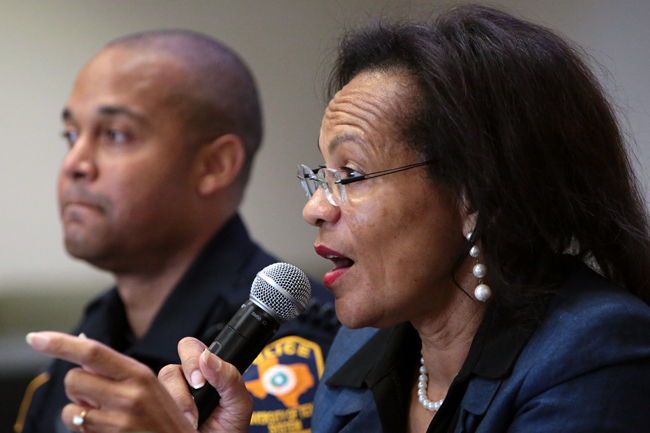Songs like “Fuck tha Police” by N.W.A. and “Cop Killer” by Body Count indicate the sentiment most young African-American men feel toward police, said Philemon Brown, president of the Black Faculty and Staff Association, during a Thursday panel discussion examining the relationship between police and the African-American community.
The panel, hosted by BFSA in Gregory Gym, included UTPD officer Jimmy Moore, government senior Wesley Nash and Dr. Chiquita Eugene, citywide manager for Austin’s Youth and Family
Services/Initiatives.
Specifically addressing how officers are to handle confrontational situations, Moore discussed
UTPD training.
Moore, an African-American, detailed UTPD’s three-level system to incident response and explained what to do and say if stopped by a police officer.
He said police first try to gain compliance by showing up, known as command presence. If that fails, officers use “verbal judo” to de-escalate situations. Physical action is a last resort and only used if preceding steps fail.
Bridging the divide between police and the African-American community begins with civic engagement and ends with an added sense of cultural awareness and education for both camps,
Eugene said.
Eugene encouraged audience members to visit police departments with their children to foster an active dialogue and dispel racial tensions with police at a
young age.
“A lot of this combative environment is based on fear,” Eugene said. “Don’t y’all know you’re pretty powerful people? You can cause people to be fearful. And fear is the state of the unknown. Reduce some of that fear. Go to your police stations. It’s good for you, and guess what, it’s good for them, too. Police officers are like us. They’re human too … It’ll give them another perspective when dealing with African-Americans.”
Chas Moore, an activist and former UT student, voiced a more radical position during the question-and-answer portion of the panel. Moore took issue with excessive policing in underprivileged areas and said it would inevitably lead to more police brutality. Moore said communities should ultimately
police themselves.
Cindy Nathan attended the event and said the panel gave her added perspective on racial tension. Nathan, whose grandchildren are African-American, said more white people should have attended the panel.
“I think bridging those relations is a good way to start,” Nathan said, “But, honestly, I would have liked to have seen more white people here. We wrote the system. For us to sit back and say, ‘Okay, now you guys fix it,’ is really, really unfair. We need to get involved, too.”





















